How To Make Learning A Family Adventure
Encouraging Learning to be a Family Adventure
By Heather Welch, Edx Education
It is abundantly clear that schools in the Middle East have been paving the way for the global education system where learning becomes a family adventure.
The school ecosystem is very complex to navigate with teachers, leadership, CEOs, holding companies and more. Schools focused purely upon teachers and their students. As a result in many parts of the world, parents have become a by-product at the education factory.
The focus to make learning part of family living in the Middle East might be a direct result of the competition for good international schools which has risen rapidly over the years.
When speaking to teachers in leading school groups in the UAE it becomes quickly evident that, today, it’s not just about the teachers, educational professionals and the immediate periphery, a key focus is the families that build the school community.
Innovations in teaching in 2020
Roll-on 2020, the year where homework morphed into the necessity of home learning in the UAE and many countries around the world. Months of lockdown, months of school lessons taking various forms at home. The CEO of Edx Education lives by the mantra, challenging times breed innovation. And yes, school teachers have had to adapt, innovate with the new way of teaching virtually, using software, become video creators. Teachers have proved, let’s face it, that if any profession can thrive in these times it is the educators of the world: they are creative, innovative, passionate and use to working with small budgets to provide maximum results.
In the UAE there has been a surge of innovation across international schools with virtual offerings using new conference calling technologies, video streaming and specialised programs to deliver lessons to children.
Fear sets into ordinary business folk: imagining a meeting with 25 colleagues on video conference trying to get a consensus. And yet teachers have coped with this many children all excited and new to this technology, all wanting to speak, change their virtual background, jump up and down, show everyone their pet, their room and so much more.
How exhausting this must be for teachers. Yes, this has definitely been a challenge many won’t forget.
Empowering the parents

The need for students to stay home has put pressure on parents. Let’s be honest, there have been struggles with parents becoming the facilitators of their children’s learning. When home became a primary learning area, parents needed to allow space – and to create time – for children’s key development skills, communication, language, creativity, fine and gross motor skills, cognitive development and so much more (see image).
Especially from a social and emotional angle. After all, it isn’t natural for a child to be in front of a screen all day learning, this can cause adverse behaviours. Many teachers have found new ways to empower the parents of their children, and we call this learning through play.
Learning through Play
The new school year is well underway either virtual, in person or a hybrid of both. And ‘play’ is perfect for helping children feel confident. Dr Cindy Hovington, the founder of Curious Neuron, gives parenting advice. She told us at Edx Education in an interview,
“School readiness means being able to build relationships with peers and teachers, follow instructions, and regulate emotions and behaviour. But research shows children are struggling with social and emotional skills. These are the skills that will lead to academic success, but can be improved simply by playing. Unstructured free play indoors and outdoors with peers and caregivers creates brain connections that will serve children the rest of their life.” And she concluded, enthusiastically, “So let’s play!”
To the untrained eye ‘play’ can look meaningless, however, there is a lot going on. When children are playing, they are engaged, their imagination is sparked and they are developing key foundation skills.
Top tips to build a family adventure:
From our conversations with UAE based and global educators, teachers and academics, we have identified a few strategies to make learning a family adventure for everyone:

Changing Perspective: This is an opportunity to be with the family, play & learn together. To look on the bright side of life. Children will build resilience, understand the world news, issues and so much more. Today life is a challenge for everyone, parents, schools, government bodies and everyone involved.
Building Experiences: Dr Paul Swan, an education consultant and curriculum advisor in Australia, looks at children providing a positive learning experience in maths, especially in the early years as it sets children up for the rest of their life.
He recommends that teachers and parents encourage different activities which are inclusive and gender-neutral. Allow them to find their passion, whether that’s unicorns, fish, boats, cars or dolls. What do they love doing? What do they find hard? Try to engage with them
with their own interests.
Active Listening: Parents need to enjoy listening more. When the children are trying to explain why the sky is blue or grass is green, or that this spider has eight legs, or as they tell you about their day or a game they played, the industry needs to encourage parents to ask open-ended questions, so they have to explain the different concepts to you, developing language and social skills. Yes, let’s encourage children to use their imagination to play, learn and create, and to tell stories to each other and to those around them.

Managing Expectations: At school the expectations of children are clearly laid out. Developing a passport or passbook (see image) which allows children to earn time for activities of their choice is one tool that parents can adopt. These might be games online or TV, where parents can even encourage their children to think of 5 activities to earn a particular reward.
Open-Ended Play: In the Middle East, there is a culture of clubs, structured activities and planned events. Outside of these clubs and activities, children need encouragement to play independently. With free time and no structure, children may need to be encouraged by starting an activity with them, showing how it works, then encouraging them with positive words, behaviours, experiences. Let’s spark those amazing imaginations. Play will help to develop fine and gross motor skills, cognitive development, curiosity, speech and language skills.
Empowering the child: Just as parents need to be empowered to show their children how to learn through play, so to do children need to be empowered. Teachers can encourage parents to show children routines, such as cleaning up their toys or making their bed. Explain what is a good choice, why certain activities are a bad choice. This will help with problem solving, perseverance and persistence in school and life. Learning is about trying again to solve the problem. As we all know, we are not always correct the first time around.
Why Learning Through Play Matters
A McKinsey & Company report estimates that “AI and robotics could eliminate about 30 per cent of the world’s workforce by 2030. The World Economic Forum predicts that technology could displace 75 million jobs by 2022, but it will also create 133 million new ones”.
There are employment opportunities not even considered in 2020 so we are looking to educate children who need to have a love of learning, be creative, innovative to become the leaders we need for the world of tomorrow.

Skills your kids will need to succeed are “softer” skills. Katrin Becker, a business psychologist with Hatch Analytics, a company based in London, that uses behavioural science to improve the workplace, says such as resilience, curiosity, communication and empathy, will be in high demand in the future.
In the UAE, most students are at international schools and many will soon move overseas to university or to work. With diverse cultures and so many ethnicities, it is important that we move forward with the evolving needs of the world.
To this end, it is fabulous that teachers and schools in the UAE are looking to empower parents to recognise the benefits of these skills and show the importance of home learning for our future generation.
To read more, Edx Education have a play blog on the website, podcast, games & videos and free downloadable resources for home learning in the teachers/parents section head over to www.edxeducation.com/teachers/parents. Let’s play and learn together.
BIOGRAPHY

Heather Welch, International Brand Manager, Edx Education
Heather is a mother, a teacher and a marketer. Right now she enjoys working with a team to develop educational toys for children to spark their imagination and learn from one another. She has lived in Australia, Singapore, UAE and now the UK with her family which includes two active boys, 10 and three years old.
Our article ‘How To Make Learning A Family Adventure‘ was published in the latest issue of Teach Middle East Magazine Teach Middle East Magazine
To see the full article click here. (Page 44-45)

 Edx Education
Edx Education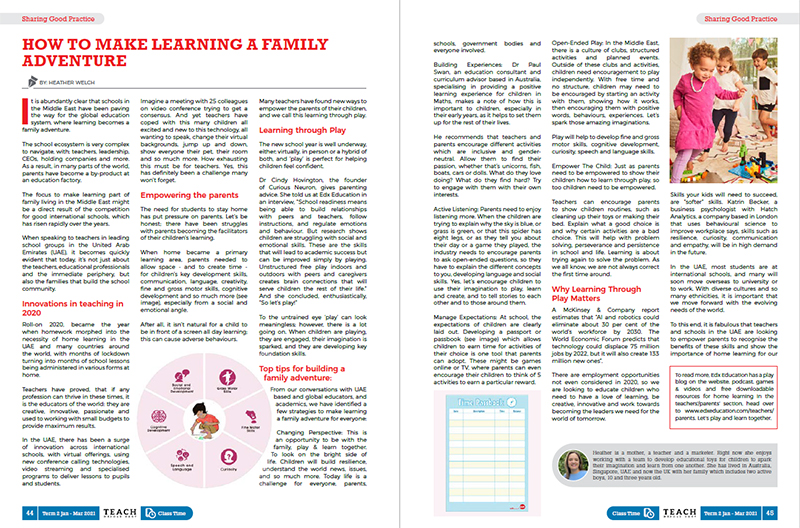
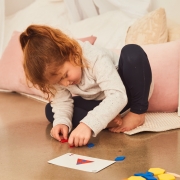
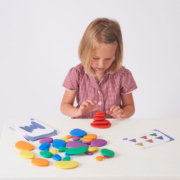 edx education
edx education 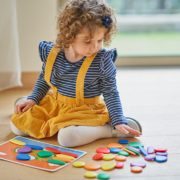 Edx Education
Edx Education 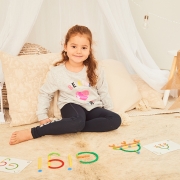 Edx Education
Edx Education  Edx Education
Edx Education  edx education
edx education  Edx Education
Edx Education Edx Education
Edx Education